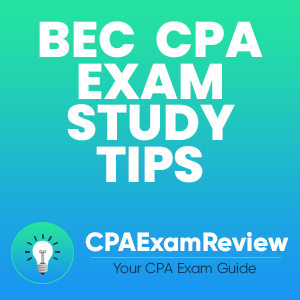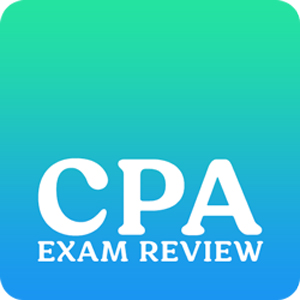 The Business Environment and Concepts (BEC) section of the CPA exam can be a formidable challenge for many candidates. It covers a broad range of topics, from economic concepts and corporate governance to information technology and operations management.
The Business Environment and Concepts (BEC) section of the CPA exam can be a formidable challenge for many candidates. It covers a broad range of topics, from economic concepts and corporate governance to information technology and operations management.
To conquer BEC, a candidate needs a well-structured approach to their studies. This article provides 15 essential study tips that focus on effective strategies to help you navigate and excel in the BEC section of the CPA exam.
15 Study Tips to Ace the BEC (Business Environment and Concepts) CPA Exam Section
Contents
- 15 Study Tips to Ace the BEC (Business Environment and Concepts) CPA Exam Section
- #1 Understanding the BEC Exam Content
- #2 Developing a Structured Study Plan
- #3 Emphasis on Conceptual Understanding
- #4 Utilizing Diverse Study Materials
- #5 Regular Practice with Multiple-Choice Questions
- #6 Mastering Calculations and Quantitative Questions
- #7 Improving Written Communication Skills
- #8 Focusing on Information Technology and Operations Management
- #9 Integrating Real-World Business Knowledge
- #10 Practice Simulations for BEC
- #11 Joining Study Groups or Online Forums
- #12 Regular Review and Revision
- #13 Time Management during Exam Preparation
- #14 Maintaining Physical and Mental Wellness
- #15 Pick Your Motivation
- Bottom Line
- Frequently Asked Questions
- What Are the Most Effective Strategies for Studying the Business Environment and Concepts (BEC) Section of the CPA Exam?
- How Can I Improve My Performance on Written Communication Tasks in the BEC Section?
- Are There Specific Areas in BEC That Require More Focus Than Others?
- What Is the Best Way to Balance Study Time Across the Different Topics Covered in BEC?
#1 Understanding the BEC Exam Content
BEC is unique among the CPA exam sections due to its wide-ranging content. It tests candidates’ knowledge in areas such as business structures, financial management, information technology, and the impact of global business on corporate strategies.
Understanding the syllabus in detail is the first step in preparing for this section. Familiarize yourself with the specifics of each topic and the weight each carries in the exam.
#2 Developing a Structured Study Plan
Creating a structured study plan is crucial. Divide the syllabus into manageable sections and allocate specific study times to each area, ensuring that all topics are covered comprehensively.
Your plan should include regular review periods and time for practice questions and simulations.
#3 Emphasis on Conceptual Understanding
In BEC, rote memorization is less effective than a strong conceptual understanding. Focus on grasping the underlying principles and rationales behind business concepts and practices.
This deeper understanding will aid you in applying knowledge to various question types and scenarios.
#4 Utilizing Diverse Study Materials
Don’t rely solely on one type of study material. Supplement your learning with textbooks, online courses, video lectures, and other professional literature. Different materials can offer varied perspectives on complex topics, enhancing your overall understanding.
#5 Regular Practice with Multiple-Choice Questions
Practicing multiple-choice questions is a key part of BEC preparation. These questions test not only your knowledge but also your ability to apply concepts in different contexts.
Regular practice can help you identify areas where you need more focus and improve your question analysis skills.
#6 Mastering Calculations and Quantitative Questions
Quantitative questions, particularly in areas like financial management and cost accounting, are a significant part of BEC. Ensure you’re comfortable with formulas and calculations. Practice regularly to enhance your speed and accuracy.
#7 Improving Written Communication Skills
BEC includes written communication tasks, making it crucial to polish your business writing skills. Focus on clarity, organization, and relevance to the question. Practice writing concise and coherent responses under timed conditions.
#8 Focusing on Information Technology and Operations Management
Information Technology and Operations Management are increasingly important in today’s business environment and are heavily featured in BEC.
Stay updated on current trends in these areas and understand how they impact businesses. Use real-world examples to relate these concepts to practical scenarios.
#9 Integrating Real-World Business Knowledge
Incorporating real-world business knowledge into your study can make learning more relatable and practical. Stay informed about current business news and trends, and consider how the concepts you are studying apply in actual business settings.
#10 Practice Simulations for BEC
Task-based simulations in BEC test your ability to apply concepts in practical scenarios. Practice these simulations to get a feel for the type of tasks you’ll encounter, such as analyzing business data or making strategic business decisions.
#11 Joining Study Groups or Online Forums
Participating in study groups or online forums can enhance your preparation. These platforms allow you to discuss complex topics, share resources, and gain insights from fellow candidates. Collaborative learning can often provide new perspectives and deepen your understanding.
#12 Regular Review and Revision
Consistent review and revision are key to retaining knowledge over the long term. Set aside time each week to go over previously studied topics. Use different revision techniques like summarizing notes or creating mind maps to reinforce learning.
#13 Time Management during Exam Preparation
Effective time management is vital during your study. Develop a balanced schedule that allocates sufficient time for each topic while allowing for breaks and other commitments. Time management skills are also crucial during the exam itself, so practice answering questions and writing responses within set time limits.
#14 Maintaining Physical and Mental Wellness
Your physical and mental well-being plays a significant role in your exam preparation. Maintain a healthy lifestyle, with regular exercise, a balanced diet, and adequate sleep. Manage stress through relaxation techniques, hobbies, or social activities.
Remember, a healthy body and mind are essential for effective learning and exam performance.
#15 Pick Your Motivation
One of the hardest things to do while studying for BEC is to stay motivated. A good strategy to stay motivated to study is to pick a reason to stay motivated. Why are you even taking the CPA exam in first place?
Are you going after a raise or applying for a new job? Use that goal as your motivation to keep going. Keep you eyes on the prize.
Stay focused, stay motivated, and embrace the challenge of the BEC exam as an opportunity to grow both professionally and personally.
Bottom Line
Passing the BEC section of the CPA exam requires a combination of strategic study, practical application of knowledge, and consistent effort.
By following these 15 study tips, you can enhance your preparation and increase your chances of success. Remember, each step you take in your preparation brings you closer to achieving your goal of becoming a CPA.
Frequently Asked Questions
What Are the Most Effective Strategies for Studying the Business Environment and Concepts (BEC) Section of the CPA Exam?
Effective strategies for studying the BEC section include developing a comprehensive understanding of key topics like corporate governance, economic concepts, financial management, and information systems. Utilize a variety of study materials, such as textbooks, online courses, and practice questions.
Focus on understanding the concepts rather than rote memorization, and regularly practice written communication tasks and quantitative questions. Incorporate regular review sessions into your study plan to reinforce learning and retain information.
How Can I Improve My Performance on Written Communication Tasks in the BEC Section?
To improve performance on written communication tasks in the BEC section, practice writing clear, concise, and well-organized responses. Focus on the main points of the question, ensuring that your answer is relevant and accurate.
Enhance your business writing skills by studying sample responses and practicing writing under timed conditions. Pay attention to grammar and clarity to make your responses easy to understand.
Are There Specific Areas in BEC That Require More Focus Than Others?
While all areas of BEC are important, candidates often find topics like cost accounting, financial management, and information technology more challenging. These areas require not only conceptual understanding but also the ability to apply concepts in practical scenarios.
Pay special attention to these topics, and use practice questions and simulations to test your understanding. Additionally, don’t neglect the written communication tasks, as they are unique to the BEC section and can significantly impact your score.
What Is the Best Way to Balance Study Time Across the Different Topics Covered in BEC?
To balance study time across the different topics in BEC, start by analyzing the content specification outline provided by the AICPA, which details the weightage of each topic. Allocate more time to topics that carry higher weightage or areas where you feel less confident.
Use a study planner to organize your study sessions, ensuring that all topics are covered proportionately. Regularly assess your understanding and adjust your study plan as needed, focusing on areas that require more practice.

